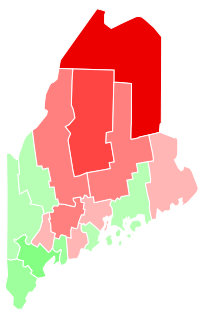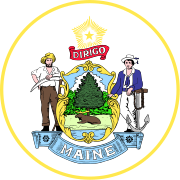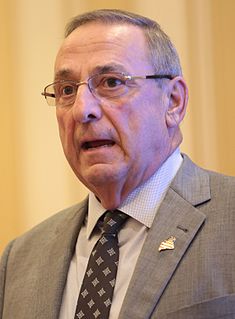
The Portland Press Herald/Maine Sunday Telegram is a morning daily newspaper with a website at pressherald.com that serves southern Maine and is focused on the greater metropolitan area around Portland, Maine, in the United States.

The 2010 Maine gubernatorial election took place on November 2, 2010. Incumbent Democratic Governor John Baldacci was term-limited and unable to seek re-election. Primary elections took place on June 8, 2010. The candidates who appeared on the November ballot were : Eliot Cutler (Independent), Paul LePage (Republican), Libby Mitchell (Democrat), Shawn Moody (Independent), and Kevin Scott (Independent).
Same-sex marriage has been legally recognized in the U.S. state of Maine since December 29, 2012. A bill for the legalization of such marriages was approved by voters, 53-47 percent, on November 6, 2012, as Maine, Maryland and Washington became the first U.S. states to legalize same-sex marriage by popular vote. Election results were certified by the Maine Secretary of State's office and the Governor of Maine on November 29.

Maine Question 1 was a voter referendum on an initiated state statute that occurred November 6, 2012. The title of the citizen initiative is "An Act to Allow Marriage Licenses for Same-Sex Couples and Protect Religious Freedom". The question that appeared on the ballot was: "Do you want to allow the State of Maine to issue marriage licenses to same-sex couples?"
Mark W. Eves is an American politician and family therapist from Maine. Eves is a former Speaker of the Maine House of Representatives and a Democratic candidate for Governor of Maine in 2018.

Maine Question 1 (MQ1), "An Act To Prohibit the Use of Dogs, Bait or Traps When Hunting Bears Except under Certain Circumstances", was a citizen-initiated referendum measure in Maine, which was voted on in the general election of November 4, 2014. As the Maine Legislature declined to act on the proposed statute, it was automatically placed on the ballot. The proposal was defeated by 320,873 "No" votes to 279,617 "Yes".

The 2018 Maine gubernatorial election took place on November 6, 2018, to elect the next Governor of Maine. It occurred along with elections for the U.S. Senate, U.S. House, and other state and local elections. Incumbent Republican Governor Paul LePage was term limited and could not seek reelection to a third consecutive term in office.

Maine Question 1, "An Act To Strengthen the Maine Clean Election Act, Improve Disclosure and Make Other Changes to the Campaign Finance Laws", was a citizen-initiated referendum measure in Maine, which appeared on the November 3, 2015 statewide ballot. As the Maine Legislature did not exercise its ability to pass the bill on its own, it was placed on the ballot and approved by Maine voters.

Maine Question 1 was a people's veto referendum that appeared on the June 12, 2018 statewide ballot. It sought to reject a law passed by the Maine Legislature that suspended the implementation of ranked choice voting, authorized by Maine voters in a previous referendum, for use in Maine elections until and if an amendment to the Maine Constitution is passed to expressly permit it; failing that, the law would be automatically repealed in 2021. It qualified because supporters of the original referendum collected the necessary number of signatures from registered Maine voters. This vote coincided with primary elections in which party nominees for governor, U.S. Senate, U.S. House, and the Maine Legislature were chosen to run in general elections on November 6.

Maine Question 5, formally An Act to Establish Ranked-Choice Voting, is a citizen-initiated referendum question that qualified for the Maine November 8, 2016 statewide ballot and was approved by a margin of 52% to 48%. It would change how most Maine elections will be conducted from a plurality voting system to a ranked-choice voting system. It appeared on the ballot along with elections for President of the United States, Maine's two U.S. House seats, the legislature, five other ballot questions, and various local elections. Maine would be the first state to use such a system for its statewide elections for governor and U.S. Senate if implemented.

Maine Question 1, "Do you want to reject the section of Chapter 399 of the Public Laws of 2011 that requires new voters to register to vote at least two business days prior to an election?", was a 2011 people's veto referendum that rejected a bill repealing Election Day voter registration in Maine. The vote was held on November 8, 2011 after being placed on the ballot due to supporters collecting the necessary number of signatures. The veto effort was successful, with 237,024 votes in favor of repeal to 155,156 against repeal.

Maine Question 4, formally An Act to Raise the Minimum Wage, is a citizen-initiated referendum question that appeared on the Maine November 8, 2016 statewide ballot. It sought to increase Maine's minimum wage from $7.50 per hour to $12 an hour by 2020, as well as increasing the minimum wage for tipped employees gradually to the same level by 2024. It would also index increases after 2024 to inflation. As the Maine Legislature and Governor Paul LePage declined to enact the proposal as written, it appeared on the ballot along with elections for President of the United States, Maine's two U.S. House seats, the Legislature, other statewide ballot questions, and various local elections. Efforts to place a competing, more moderate proposal alongside the citizen-initiated bill were unsuccessful.

Maine Question 3, formally An Act to Require Background Checks for Gun Sales, was a citizen-initiated referendum question that appeared on the Maine November 8, 2016 statewide ballot. It sought to require a background check for virtually all gun transfers in Maine, with some exceptions. As the Maine Legislature and Governor Paul LePage declined to enact the proposal as written, it appeared on the ballot along with elections for President of the United States, Maine's two United States House seats, the Maine Legislature, other statewide ballot questions, and various local elections.

Maine Question 1, formally An Act to Legalize Marijuana, is a citizen-initiated referendum question that qualified for the Maine November 8, 2016 statewide ballot. It was qualified for the ballot after a Maine Superior Court judge ordered that petitions rejected by the Maine Secretary of State be reconsidered. The proposal seeks to legalize the recreational use of marijuana in Maine for those over the age of 21, and institute a 10 percent tax on its sale. As the Maine Legislature and Governor Paul LePage declined to enact the proposal as written, it will appear on the ballot along with elections for President of the United States, Maine's two U.S. House seats, the Legislature, other statewide ballot questions, and various local elections.
Brian Hubbell is an American politician who was elected to the Maine House of Representatives in 2012. He represents the 135th House District as a member of the Democratic Party. He is a member of the Joint Standing Committee on Appropriations and Financial Affairs and a member of the Joint Standing Committee on Veterans and Legal Affairs.

Maine Question 2, formally titled "An Act To Enhance Access to Affordable Health Care", is a citizen-initiated ballot measure that has qualified for the November 7, 2017 statewide ballot. It seeks to expand Medicaid eligibility under the terms of the Affordable Care Act, something which has been vetoed six times by Maine Gov. Paul LePage.

Maine Question 1, formally An Act To Allow Slot Machines or a Casino in York County, was a citizen-initiated referendum question that appeared on the November 7, 2017, statewide ballot in Maine. It sought to award a license for the construction and operation of a casino in York County, Maine by a qualified entity as spelled out in the proposed law, with tax revenue generated by the casino to go to specific programs. The wording of the proposed law effectively permitted only one company, Capital 7, to be awarded the license. The ballot measure was defeated, with 83% of voters opposing it.

Maine Question 1 is a citizen-initiated referendum that appeared on the November 6, 2018 statewide ballot. It sought to implement a tax on higher incomes in Maine to fund in-home health care services for elderly and disabled Mainers, as well as to create a government board to administer the funds. The vote coincided with general elections for governor, U.S. Senate, U.S. House, the Maine Legislature, and other local elections. It qualified for the ballot due to supporters collecting signatures from registered Maine voters.









